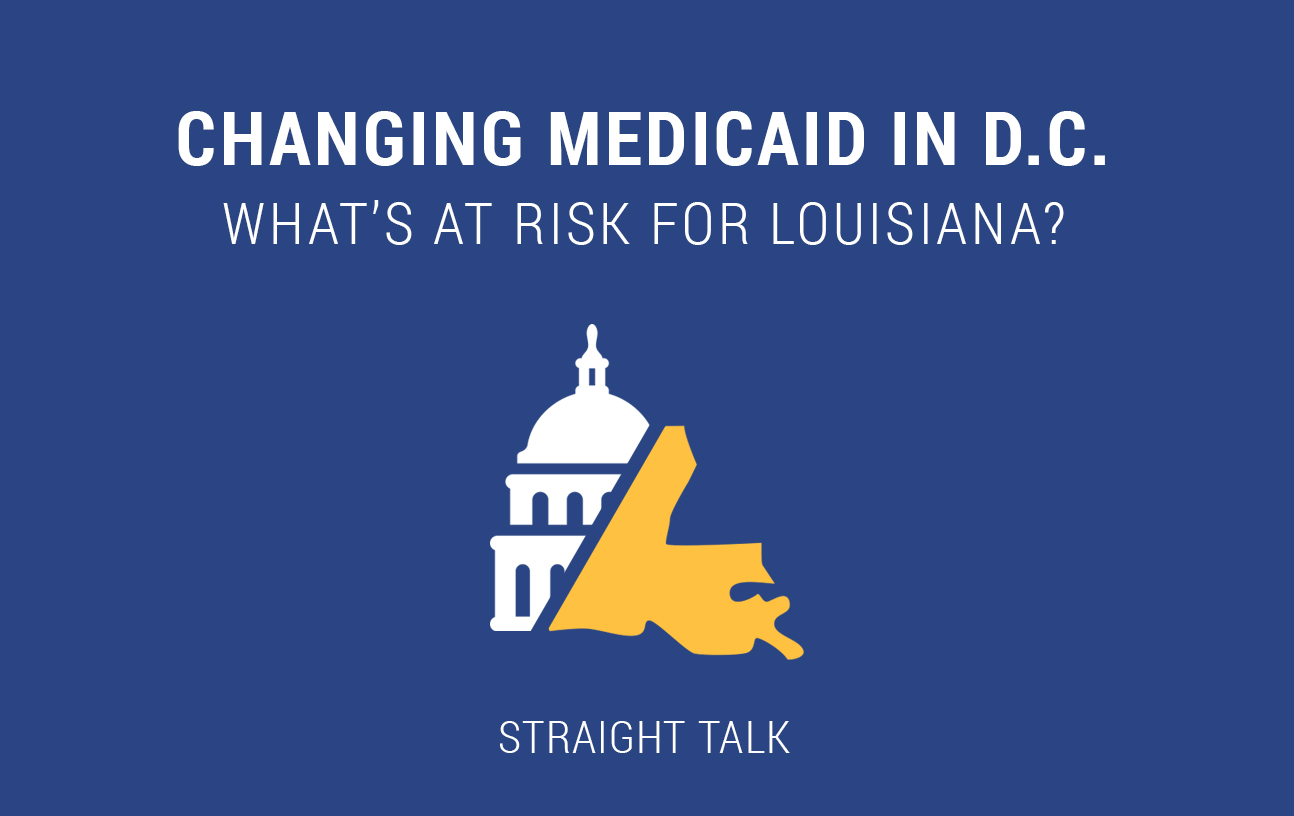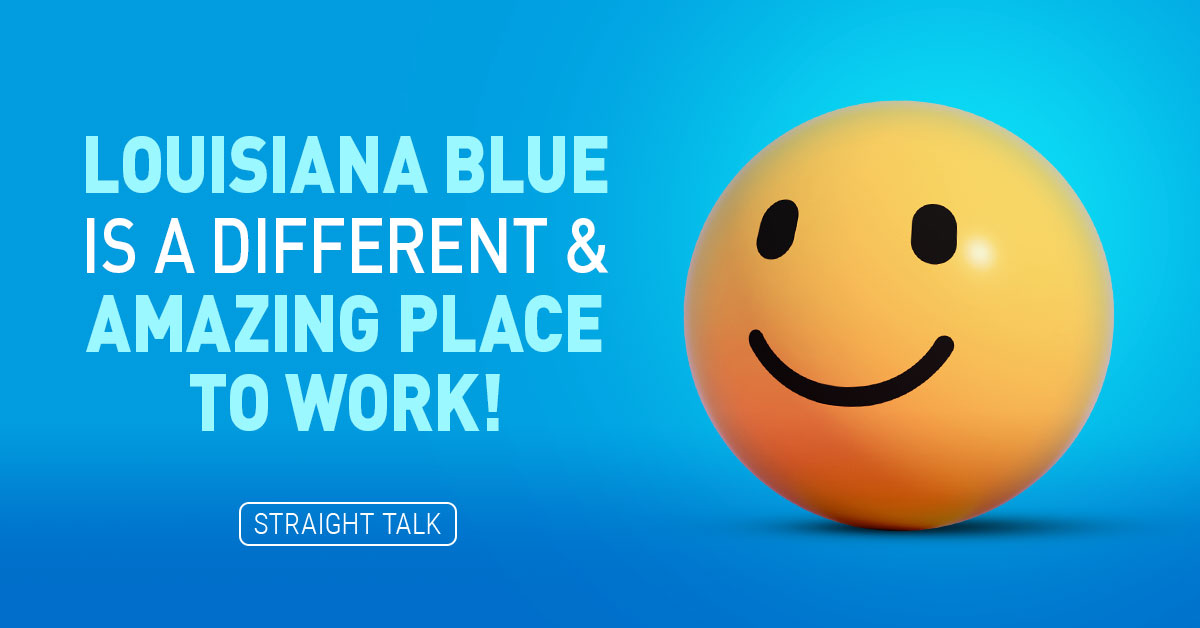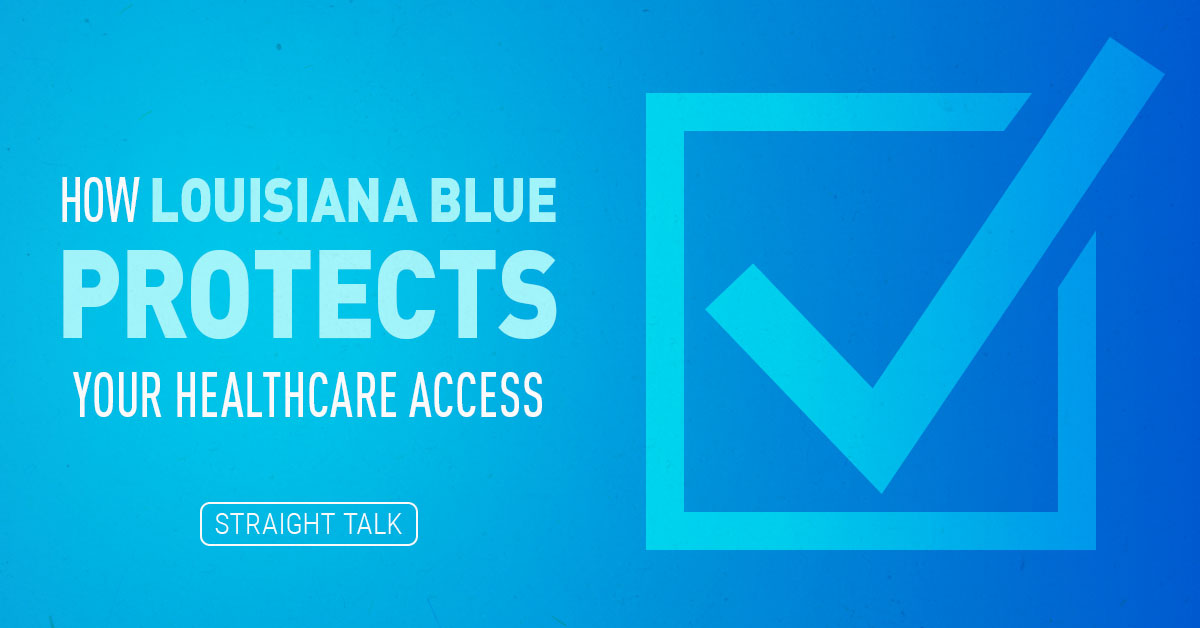Mike’s Note: I’m taking a look at the bill proposed Monday by the House of Representatives – the American Health Care Act – and will weigh in with my thoughts soon.
The way our federal government funds Louisiana’s Medicaid program is under serious study right now. The party in charge in Washington, D.C., has indicated they really want to make some changes. These changes have serious implications for all of us in Louisiana, and for me to continue to be Straight with you, we need to chat about that.
If you’re not familiar with Louisiana’s Medicaid program, I think it’s important that we all understand how it works and what’s going on with it since changes seem increasingly likely.
“Louisiana Department of Health (LDH) data shows that more than 405,000 people have enrolled in “new” Medicaid, which is now called “Healthy Louisiana.” Think about filling the Superdome to the top six times – it’s that many people.”
Original Medicaid
Medicaid was created during the 1960s as a healthcare program for the poor and the indigent. “Indigent” is just another way of saying poor, or needy, or homeless or destitute. All situations we hope we never find ourselves in, right?
The program is a financial partnership between our state and the federal government. Both must contribute money to make it work. Louisiana’s original Medicaid program requires that the state funds roughly 38% of the expenses, while the Feds pony up 62% and covers people who are very poor, disabled, blind, have certain cancers or are pregnant women and kids in low-income households
At the end of June 2016, 1.4 million of the neediest of our friends and neighbors in Louisiana were in original Medicaid, which still operates and for which we still pay 38% of the costs.
Expanded Medicaid
The Affordable Care Act (ACA or Obamacare) gave states the option to expand that envelope of Medicaid coverage to able-bodied adults who happen to be low income. Think about the working-poor people you know who make $8, $9 or $10/hour but don’t get health insurance at work, or couldn’t afford it even if their bosses offered it. That’s who we’re talking about here.
To sweeten the deal, the Feds even put Medicaid “on sale” for this new population – only requiring the states to pay 5-10% of the total costs from 2017 on. Compared to our continued state contribution of 38% for the “original” Medicaid population, 5-10% of state money is a pretty incredible deal.
“As you can see, tens of thousands of our friends and neighbors here in Louisiana are benefiting from Medicaid expansion. It is literally saving lives and changing future healthcare outcomes.”
In Louisiana, on July 1, 2016, Medicaid expanded in Louisiana to the “new” population, thanks to an executive order our governor signed on his first day in office. It’s been eight months since the expansion started, and I think it’s important that we all take a look at how that is going.
Louisiana Department of Health (LDH) data shows that more than 405,000 people have enrolled in “new” Medicaid, which is now called “Healthy Louisiana.” Think about filling the Superdome to the top six times – it’s that many people.
Expansion Outcomes
But Mike, is it helping them, changing their life, are they healthier?
Great question! Here’s the latest from Healthy Louisiana:
- More than 62,000 of our friends and neighbors have had a doctor’s appointment and/or preventive care in the new program. Among them:
- 5,700 women have been screened for breast cancer
- 74 new cancer cases were identified
- 5,800 adults have had colon cancer screening
- 1,600 had potentially problematic polyps removed
- 64 were diagnosed with full-blown colon cancer
- 3,200 adults who had very high blood pressure, and no idea they did, were identified
- 1,300 adults who had very high blood sugar, and no idea they did, were diagnosed
- Unregulated high blood pressure plus high blood sugar causes the majority of kidney failure in Louisiana. Dialysis or transplants to treat kidney failure are among the most expensive conditions we treat in Louisiana.
- 5,700 women have been screened for breast cancer
As you can see, tens of thousands of our friends and neighbors here in Louisiana are benefiting from Medicaid expansion. It is literally saving lives and changing future healthcare outcomes.
So far, it has resulted in savings for Louisiana’s state budget, but there is no guarantee that will always be the case, as it’s likely political officials calling to alter or cut back this new coverage will become louder as the state starts bearing more of the costs for the newly covered folks.
What’s the Future of Medicaid?
A huge debate is going on in Washington, D.C., right now about the future of the entire Medicaid program. This debate has the potential to affect our ability to finance healthcare in Louisiana for more than 1.8 million of our 4.6 million residents, typically the poorest and neediest among us.
So Mike, this is all really interesting, and important, but what do you think about it all? What’s the Straight Talk on this whole repeal and reform thing?
That’s a tough one for a variety of reasons. The economist in me would really like to see the state have more control over those federal dollars. Why do we only get a 62% match on the neediest part of the population, and a 90-95% match on the able-bodied part of the population? When we are trying to close a budget gap, the incentive in the current system is to cut services for those who can afford it the least. I’m not wild about that part of the system.
“Straight Talk demands that we tell our leaders in D.C. that their decisions about Medicaid might be the most important ones they make in their entire lives.”
I also don’t like to think of Washington, D.C., as some endless pile of money. The federal treasury is borrowing more than $600 billion a year now (down from a peak of $1.4 trillion back in 2009), and I don’t expect we’ll be able to do that forever. Washington tax dollars coming into Louisiana pay the vast majority of our Medicaid expenses, both in the old and especially in the new program. That’s a real consideration.
Washington, D.C., has been very generous to Louisiana; our state gets back almost $3 from D.C. for every $1 we pay in federal taxes. That’s a pretty good deal.
Where Does Medicaid Go From Here?
But in the end, I think we all should default to our mission here at Blue Cross: To improve the health and lives of ALL Louisianans. That’s why I signed up for this. As a cancer survivor myself, how can I do any less? How can I possibly live with a system that constrains important care to needy people? Can you? Let’s just say that’s not going to help you, or me sleep at night.
Straight Talk demands that we tell our leaders in D.C. that their decisions about Medicaid might be the most important ones they make in their entire lives. That they must look into the future and make absolutely sure the neediest among us are well cared for. As Medicaid moves past 50 years of existence, state and federal healthcare decision makers have an obligation to maintain a benefit system that gives the poor but able-bodied among us access to all the healthcare services they need to stay healthy, including medications for chronic illness, mental health services and screenings for dangerous health conditions.
Finally, we are counting on our leadership to realize that in just eight months, around 10% of our population gained medical security through the Medicaid expansion. It’s clearly improving their lives, and you can see the results both above and at this link in more detail. Any plan to undo that will have serious costs in terms of the health of our state and the lives of our friends and neighbors. We are counting on them not make any changes without considering all those impacts.
Straight Talk demands it.





Leave a Reply